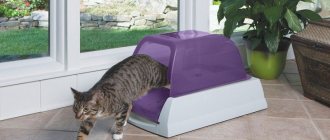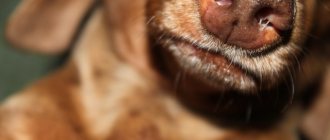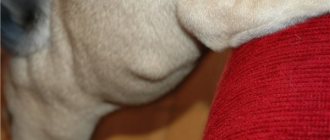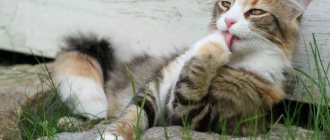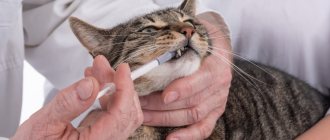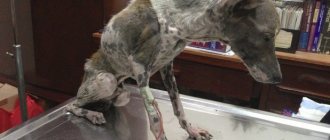Citrus scents including lemon and lime
It has long been noted that dogs are not good with citrus fruits: lemons, oranges, grapefruits, etc. So, if you notice how your beloved dog methodically chews the legs of chairs, first try treating them with orange or lemon peel or using a citrus spray. It is a good idea to mix the zest and coffee grounds remaining in the coffee machine or coffee pot. If your mischievous person has set his sights on certain plants, gnaws and spoils them, feel free to treat them with the resulting mixture. The mixture, by the way, has a dual purpose: it repels dogs and serves as an excellent fertilizer for flowers and plants.
Repellent odors
Smells that cause disgust in dogs can be divided into several categories. These include natural scents, artificial scents and special repellents designed to keep dogs away from restricted areas. Let's talk about each of the categories in more detail.
Natural smells
Natural odors include the odors of fruits, vegetables and plants, which do not require complex manipulations to obtain. In most cases, it is enough to place strong-smelling objects around the desired location to achieve the effect.
Natural odors have a gentler effect on your pet’s sense of smell, unlike chemicals.
Pepper
Pepper is a universal “repellent” due to the intensity of the aroma it emits. Both the negative and positive sides of pepper converge in the effectiveness of this product. Its aggressive influence on the olfactory system imposes certain prohibitions on its use: it is undesirable to resort to it when training puppies or hunting breeds that have a more sensitive sense of smell.
Pepper repels dogs both in its original form and in powder form.
Cayenne pepper scattered around the perimeter of the flowerbed will scare away domestic and stray dogs from it and ensure the safety of the plants. The dose of the product is determined by the size of the treated area. The main disadvantage of this method of dealing with uninvited guests is the need to re-treat the area after each rain.
Pepper can also be used in the form of a crushed pod, wrapping the product particles in gauze and spreading it around the house or around the dacha area. Shoes rubbed with such a pod discourage the puppy's interest in them after the first acquaintance.
You can rub a decoction of pepper on plants and objects without worrying about them spoiling.
Treating plants with a decoction with the addition of pepper will be effective. To prepare such a decoction, just dissolve one teaspoon of red pepper in a glass of water and boil the resulting liquid.
Makhorka
This type of tobacco may be known to many thanks to movies in which criminals hid their tracks using shag. On animals, shag produces a negative effect, prompting them to move away from the territory it has marked. Finding shag can be not so easy, so tobacco from ordinary cigarettes may be suitable as an analogue.
Thanks to its pungent odor, shag repels any animals with sensitive noses.
Shag can be used in dry form - just sprinkle it on an object or area that is forbidden to the dog. It is also possible to brew this type of tobacco and, if desired, mix it with other caustic ingredients (such as ground pepper) to enhance the effect.
Citrus
The smell emitted by citrus fruits is the worst enemy of both cats and dogs. You can use citrus fruits in any way: by laying out orange slices or orange zest, or by rubbing the fruit on surfaces that dogs cannot access. It is worth keeping in mind that hostility to citrus fruits is individual in nature.
Grapefruit peel is a real olfactory bomb in the fight against animal curiosity
The most aggressive fruit is grapefruit; oranges and tangerines have less impact on animals and may even attract them. The most effective is citrus essential oil, which can be purchased at any pharmacy and soaked into surfaces.
Hellebore
This remedy is little known in wide circles, but its alternative name “volkogon” speaks for itself. Hellebore does not grow in all regions of Russia and is currently popular in the taiga. A few stems of this plant are enough to discourage a dog from the forbidden area once and for all.
Due to the toxicity of this plant, it must be used with knowledge of the possible consequences.
The main disadvantages of hellebore are the difficulty in acquiring the plant and its toxicity. Unlike citrus fruits, shag and pepper, hellebore is fraught with real danger and can be fatal if ingested by a pet.
Large predator
Of course, supplying a garden flowerbed with bears to scare away dogs would be a completely pointless undertaking. However, formally, it is the smell of predators that gives an unambiguous command to the dog to retreat and hide in a safe place.
Animals smell the scents of their relatives over long distances and avoid encounters with strong individuals.
Probably, in the not so distant future, the odors of large and dangerous predators will be successfully synthesized and will fit into a compact bottle. In this case, this particular scent will be one of the most effective.
Artificial smells
All artificially synthesized odors, one way or another, produce a depressing impression on animals, forcing them to stay away from the source of the aroma. You can verify this by spraying deodorant near the animal and observing its reaction. Most likely, the dog will wrinkle and run to another corner.
Any sprayed substances cause dogs to want to move away from the source of the smell.
What can we say about more aggressive chemicals such as acetone or calcium carbide. Chemical odors should be used with extreme caution so as not to burn the animal’s sinuses or cause an acute attack of allergies.
Calcium carbide
If desired, calcium carbide can be purchased; it is sold in kilograms. However, one can hardly find the use of this compound in everyday life. It is not poisonous, but it emits a noticeable aroma in any condition. The smell intensifies when water comes into contact with calcium carbide, becoming unpleasant not only for the animal, but also for humans.
Calcium carbide is practically not used at home because it can be harmful
Moreover, this substance tends to release alkali, which is harmful to both plants and floor coverings. It is unacceptable to leave calcium carbide in the presence of children, as it can cause skin irritation if handled carelessly.
Perfumery
Smells that please people often cause sharp rejection in pets. This is partly due to the alcohol found in most perfumes and antiperspirants, which dogs can barely tolerate. However, there are individuals that demonstrate striking indifference to both fragrances and alcohol base.
Despite the fact that perfumes have a rich aroma, dogs' reaction to them varies from person to person.
In addition to an unpredictable reaction to perfume, it is also possible for your pet to become accustomed to certain, even strong odors. Addiction occurs faster if the aroma of perfume is filled with positive associations with the owner. As an aside, it should be noted that many dogs are intolerant of mouthwash.
Volatile organic compounds
Dogs do not perceive odors well:
- Gasoline;
- Household chemicals;
- Solvents;
- Essential oils;
- Varnish;
- Vinegar.
Dogs share a dislike for volatile organic compounds with humans.
It is these substances that ideally fall into the VOC category. You can often notice a negative attitude of a dog towards a tipsy owner who is trying to pet the animal, sometimes even turning into aggression. It's all because of the smell of alcohol, which seems unbearable to the dog. The combination of an unpleasant odor and a beloved owner causes internal dissonance and causes the animal to experience double stress.
It is unlikely that any owner would dare to use gasoline or solvents at home, since the aromas from these products are harmful to all living beings, without exception. But vinegar or pure alcohol can be very useful in the fight against an intractable dog without causing poisoning or burns.
Alcohol is the least toxic volatile compound, but its duration of action is short
It is enough to moisten a cotton wool or swab in the chosen liquid and place it in the right place to shock the dog’s sense of smell. The only weak point of such products is their rapid evaporation. In this case, mothballs, which have a persistent aroma, can come to the rescue - a pleasant bonus of using them will be getting rid of moths along the way.
Video - Smells that turn off dogs
Chili powder or black pepper
A well-proven remedy that helps fight door scratching.
Some dogs, bored when alone, exhibit destructive behavior patterns. In particular, they scratch the front door. Now is the time to apply the “anti-odor” - place a little powder or black pepper in the doorway (preferably at its base). By the way, you don’t need a lot of spices - in most cases a tiny amount is enough. Pepper will also help out in other circumstances, for example, when a dog starts tearing up carpets. However, be careful when there are small children in the house, who are known to love to crawl on carpets. Children tend to grab everything and then taste it.
You can try using cayenne pepper to treat your favorite lawn in the garden, doorways, armchairs, chairs and stools. The seasoning also has a dual purpose: it prevents your pet from eating greenflies on lawns and beds, and acts as a natural pesticide, effectively fighting insect pests of all stripes.
These are the tips we have in store for you today, dear readers. We hope that now, on the eve of the gardening season, they will prove useful and relevant. In conclusion, another piece of good news. Neither citrus peel, nor hot peppers, nor even vinegar are toxic to your four-legged friends. Their smell is simply unpleasant and disgusting. However, use our advice wisely and in moderation, taking precautions.
Original: Smells That Dogs Really Don't Like. Source and photo: pets4homes.co.uk
Why does an adult dog shit in the house?
To cope with a similar problem that manifests itself in an adult pet, you will have to work hard on it. To retrain such a dog, in addition to auxiliary means and smells that repel dogs, you will need a lot of patience and perseverance, as well as intensive training.
We recommend: Best ideas for storing pots and pans
Before taking any action against animals, Miss Clean magazine recommends determining the reason why they began to behave this way. You may need to consult your veterinarian.
- Diseases of the genitourinary system are characterized by a frequent urge to urinate; a dog in such a situation simply cannot wait to go for a walk.
- Incontinence caused by old age or illness. A sick pet should never be scolded. For a dog, the fact that he gets dirty in the house is already stressful. Be sure to show your pet to the veterinarian, buy dog diapers or nappies.
- At one time, the animal did not develop a feeding and walking regime. To eliminate the problem, your pet should be provided with regular meals and walks.
- An owner who once shows aggression towards a dog may lose authority in front of it. She may start to shit even when he starts talking to her loudly.
- A dog can also write out of boredom, that is, when no one is playing with him, showing in such a simple way that he needs more attention. This could be a kind of protest, for example, if another pet appeared in the house or even a child who was given more attention.
Interesting fact Normally, a dog not only relieves itself on the street, but is also jealous of cleanliness in the house. Owners who have a dog and a cat may have noticed that the dog often cleans up after a “rowdy” cat. This is how the dog takes care of cleanliness and protects his furry friend from the righteous anger of his owners.
How to get rid of unwanted pets?
It often happens that other people’s pets come into the territory of owners who don’t even have a dog. Their marks can have a detrimental effect on lawns, carefully planted plants and shrubs. Moreover, as soon as one dog pees in the garden bed, the smell begins to attract a pack from all over the area. But you shouldn’t rush to give in to such invasions; there are many methods for dealing with “uninvited guests.” In this case, it is not the beds that need to be protected, but the entire garden plot.
Lavender or thorny bushes
Plant plants that do not have a pleasant scent for dogs, such as lavender. This way you will create a natural repellent barrier.
Fence
The best remedy for uninvited guests is, of course, a good fence. Of course, a dog looking for a secluded place will choose an unfenced area. Periodically check along the fence for any digs made by animals. Applying current to the fence is used only as a last resort - this can be dangerous not only for dogs or cats, but also for people.
Ultrasonic repeller
Alternatively, you can use a repeller with ultrasonic radiation. The device is installed near the location of the dog gathering. As the animal approaches, the motion sensor will be triggered and automatically release ultrasonic waves. Dogs are too sensitive to this range and will rush to leave your garden as quickly as possible.
